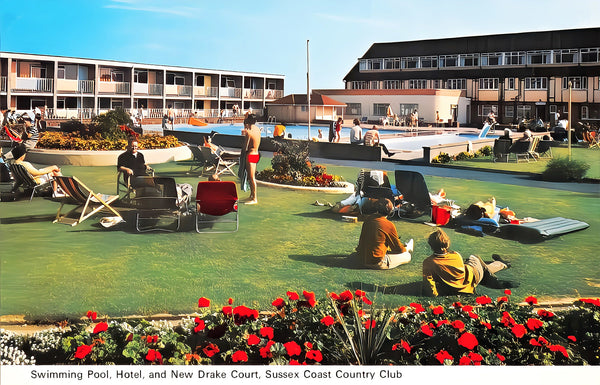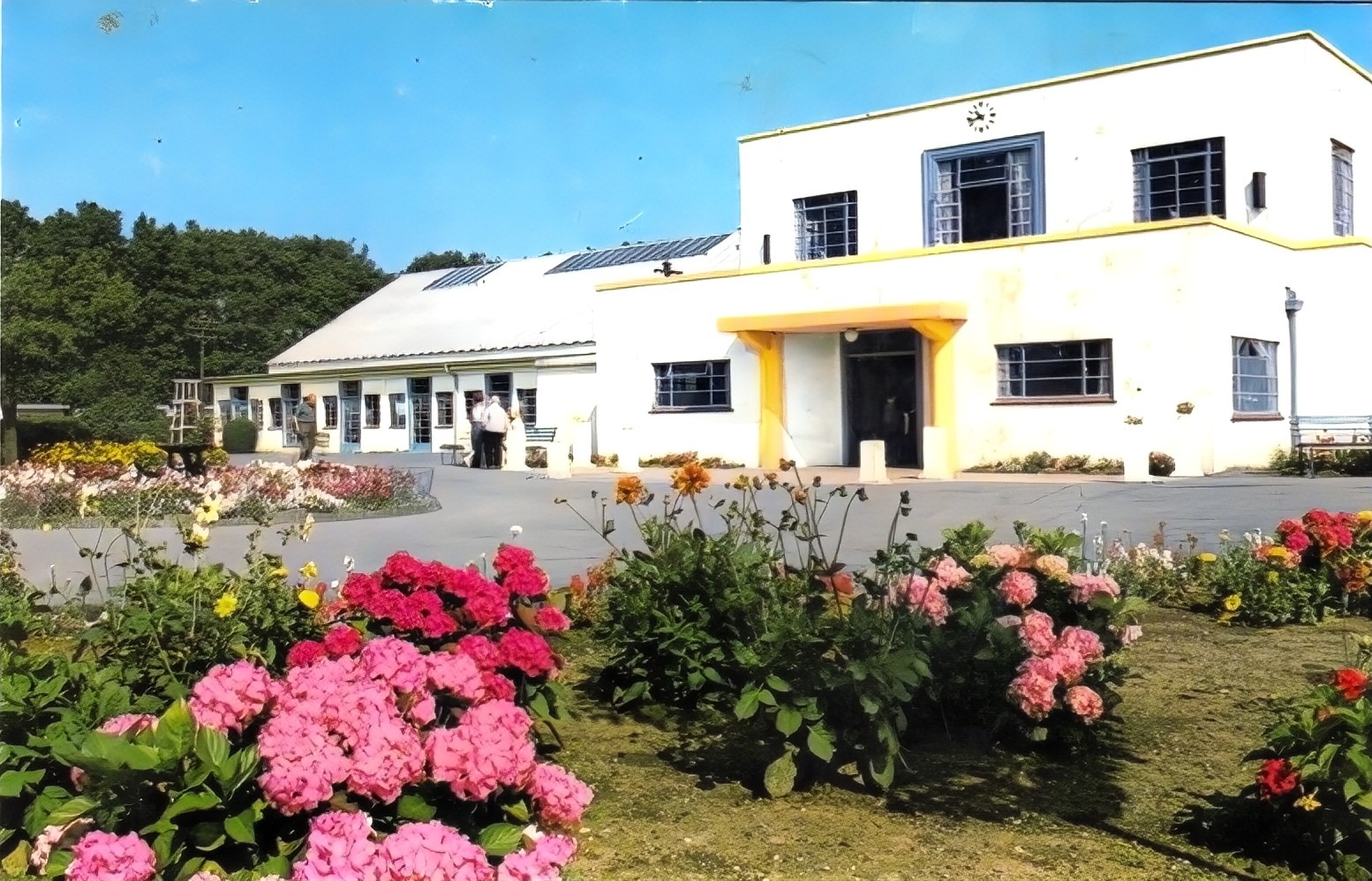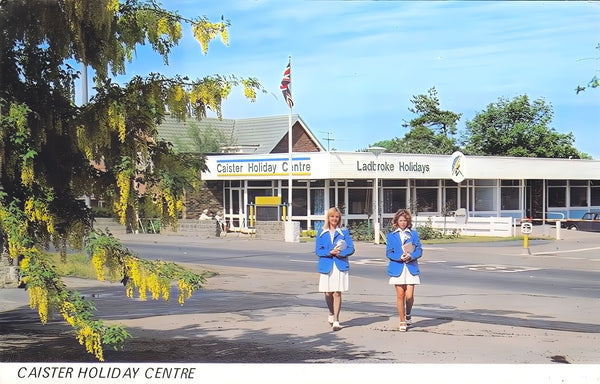Fred Pontin was born in London’s East End in 1906 and started his career as a messenger boy at the London Stock Exchange. There, he quickly gained insight into how companies raised capital by issuing shares and observed that there was always a steady stream of investors ready and waiting.
During World War II, Pontin was unable to enlist due to a hearing issue, so the Ministry of Labour sent him to the Orkney Isles. There, he worked with a catering manager to supply affordable meals for thousands of workers building military defenses and airfields, helping to source food and find creative ways to keep costs down.
After the war, Pontin used this catering experience to start his own mass catering business. He quickly secured a contract in Bristol, where he provided meals for thousands of construction workers rebuilding the city.
In 1946, Pontin discovered two holiday camps up for sale at Brean Sands and Osmington Bay. Both had opened in the 1930s under the ownership of George Harrison and Leslie Dean, trading as Chalet Camps Ltd. While Brean Sands was in need of significant repairs, Osmington Bay had weathered the war in relatively good condition.
Pontin assembled a group of friends and investors to form a consortium, raising £72,600 to purchase the company and the two camps. Alexander Bernstein became the largest shareholder, holding an 18% stake, while Pontin himself took a 9% share, largely financed by a bank loan. Leslie Dean retained a small stake.
Soon after, the company was publicly listed on the Bristol Stock Exchange in a complex transaction later described as “unprecedented and unlikely to succeed under today’s stricter regulations.” The flotation generated enough capital to allow the company to acquire four additional camps over the following two years.

The directors appointed Pontin as Managing Director with an initial salary of £1,000 per year, plus £200 in expenses, along with 5% of the net profits—a benefit that, by the 1970s, made him one of the highest-paid executives in Britain. Although Pontin had considerable freedom in running the company and served as its public face, some of the decision-making behind the scenes was handled by fellow director, Ann Miller. Pontin later acknowledged that he could never have achieved as much as he did without Miller’s business insight and expertise.
The company went through a rough patch in the early-1950s but things improved towards the end of the decade and more camps were acquired. He’d sometimes buy a camp privately, run it for a year or two and then sell it to Pontins Ltd in return for company shares. This came to a halt after shareholders complained he was trading outside the company’s influence and profiting unfairly from the disposal.

In the early years all holiday camps operated on a full board basis with all meals included. The chalets often consisted of nothing more than a bedroom, and sometimes a bathroom. Communal toilets and shower blocks were still popular in the early days. But customers later demanded more space, more luxury and more freedom from the regimented meal times.
To meet this demand Pontin introduced self catering. New larger chalets were built featuring kitchens, dining tables, living areas and bathrooms. Unlike full board, which was charged per person, self catering was charged per apartment. So it often worked out much cheaper for larger families. But you had to supply your own meals.
Pontin opened two of the country’s first all self-catering camps at Wick Ferry and Wall park in 1963. Most of the Pontin camps built after that date were all self-catering and were known as ‘Rent a Chalet’ sites. All had coin meters for electricity and push button timers in the showers. Even the early TVs had coin meters! One of the first customers at Wick Ferry complained that it cost “2s for three hours TV!”.


Many of the older full-board camps remained unchanged, as retrofitting the chalets with kitchens and dining rooms would be impractical. So, Fred Pontin took a new approach to full board dining by eliminating waitresses and fixed menus and replacing them with an all-you-can-eat buffet system. While other camp owners warned him it would be a costly mistake, the opposite proved true. The new system actually saved money, and it soon became a model that other camps began to adopt.

In 1963 the original Brean Sands camp underwent a massive expansion to become the first of the Pontin self catering mega-camps. These huge sites could accommodate thousands of people in hundreds of flats. Over the next 10 years more such camps were built at Prestatyn, Camber Sands, Hemsby and Southport. They lacked the charm and character of the smaller sites, and most ended up looking more like council estates, but for the time they were hugely popular.

Pontin was also one of the pioneers of cheap package holidays with his Pontinental company. He opened his first overseas hotel in 1963 with the brand-new Pineta Beach resort in Sardinia. After some early teething troubles and several years of losses, the division later generated 20% of annual company profits.

During the 1960s Pontin befriended a young builder named Trevor Hemmings with some describing him as a protege, or surrogate son. He’d already built up a large and successful construction business and was awarded the maintenance contract for all the Pontin camps. Hemmings later went on to build the new camps at Southport and Prestatyn. In 1976 he sold his construction company to Pontins in return for 500,000 company shares, making Hemmings the second largest shareholder.
By this time Pontins had 22 UK camps and was catering for a million people every year, about the same as Butlins (who had 8 camps). Pontins was always a bit cheaper than Butlins, mostly because they had smaller camps and fewer facilities, but they were usually considered a bit better when it came to food and accommodation.

In the 1970s, Pontins launched their Hobby & Leisure holidays, a program designed to attract guests during off-peak months. These holidays quickly grew into one of the UK’s largest selections of specialist activity breaks, covering everything from ballroom dancing and numerous sports to music lessons, and dance festivals. During the model-making event it would not be unusual to see the swimming pool filled with radio control boats! Or see steam trains chuffing by outside. By the 1980s, Pontins was offering over 40 unique events annually. Interest began to decline in the 1990s, and the program gradually faded away.

Pontin was well regarded for his charitable work and he won many accolades and rewards including the British Red Cross Badge of Honor. He was Chief Barker of the Variety Club of Great Britain in 1968, raising £1 million, and was president for 16 years.


But he was certainly no saint and his womanising and abrasive management style, often marked by bullying and humiliation, would probably not be tolerated today.
Pontin once kicked out a one-legged customer for complaining about the lack of disabled facilities. A clause in the 1960s Pontins brochure stated “We regret that we are unable to accept bookings in respect of invalids, infirmed and disabled people”. After a woman complained to the media in 1969 the company apologised and said the clause was ‘clumsily worded’. Even as late as 1994 Pontins were saying that “some of our chalets are on the first floor and many of our locations are unsuitable if you are disabled or have difficulty getting around”.

But to the masses Pontin remained a popular figure and he became quite the celebrity through his regular TV adverts and his famous ‘book early’ catchphrase. Always on the lookout for publicity he owned a handful of racehorses which he renamed after various aspects of his business – Go Pontin, Pontingo, Go Pontinental and Cala Mesquida (his holiday resort in Majorca). The Jockey Club took a dim view of this blatant publicity and banned any further name changes.
The horses were stabled at his Farringford Hotel on the Isle of Wight. He once bought a horse called Specify which he entered into the 1971 Grand National as a 28-1 outsider. Specify went on to win the race and was later buried at Farringford where his stone plaque can still be seen today.

Fred Pontin was knighted in 1976, but just two years later, the business was sold to Coral Leisure for £56 million. At 72, Pontin stepped down, though he later admitted he regretted the sale—a decision that was largely out of his hands. He walked away with £1.7 million, along with a £200,000 golden handshake as compensation for loss of office. Trevor Hemmings took over as managing director. To keep himself busy, Pontin ventured into the hotel business and acquired the London Dungeon from its original owner.

In 1980 Coral Leisure, along with Pontins, was sold to Bass Brewers. Hemmings continued to lead Pontins but with a growing focus on shutting down the camps and redeveloping the land. In 1987 Hemmings headed a management buyout to secure full control of all the UK camps. Four were closed during the 1980s followed by another twelve in the 1990s. Several of these camps were “sold” to Manor Parcs, a company also controlled by Hemmings to exploit the development potential.
The holiday camp boom had peaked and was now on the downward slope with many camps struggling to stay afloat. Although it was unfortunate to see them close, the rising land prices were difficult to ignore and it’s highly likely that Pontin himself would have done the exact same thing.
By the 1990s the remaining camps were looking a bit rundown so in 1996 Pontins embarked on a 4-year £55 million refurbishment scheme. The money was spread around eight different camps and was not nearly enough to refurbish everything, but it tackled some of the bigger issues and several new attractions were added.
Sir Fred Pontin died in 2000 at the age of 93.

In 2008, Pontins was sold to Ocean Parcs, a consortium led by former Pontins executive and Trevor Hemmings protégé, Graham Parr, for £46 million. By then, only eight camps remained, three of which were still owned by Hemmings and excluded from the sale. The new owners announced ambitious plans for a £50 million refurbishment, but little progress was made, and the company ultimately fell into insolvency in 2011.

The 5 remaining camps were then sold to Britannia Hotels for £18.5 million. They accused the previous management of “milking it for money” and of “tremendous arrogance”.
Britannia have since been blamed for everything that went wrong with Pontins but the reality is that they inherited a bunch of rundown camps that had been starved of investment for years. Britannia set about refurbishing most of the chalets with new flooring, paint, furniture, kitchens and bathrooms. Entertainment buildings were refurbished and acres of new carpet was installed.




The refurbishment was not exactly of the highest quality, and the phrase “lipstick on a pig” certainly springs to mind. However the camps under Britannia looked better than they had in years. In 2013, they were awarded the UK Customer Satisfaction Index award for being one of the most improved businesses in the UK. The following year, they even bought back an old full-board camp at Sand Bay, which Hemmings had sold 14 years earlier.
But at the end of the day, the new paint and carpet couldn’t disguise the fact that many of the buildings were life expired. Butlins had spent millions on building new chalets while Pontins were still using their 1960s “council flats”.
Butlins were raising their prices and going upmarket while Pontins were lowering theirs and going downmarket. This often attracted undesirable guests and the low prices didn’t leave much left over for cleaning and maintenance. The camps began looking rundown again and the negative reviews were getting out of hand.




After a promising start Britannia seemed to give up and admit defeat. At least they tried…
They eventually threw in the towel in 2023 by announcing the closures of the mega-camps at Camber Sands, Southport and Prestatyn. Brean Sands also closed due to a 3 year contract to house workers for the nearby Hinckley C nuclear project. Its long term future is unknown.
Only two camps now remain under the Pontins name – Sand Bay and Pakefield. Both are smaller adults-only sites dating from the 1950s Fred Pontin era. Offering neat brick chalets, attractive gardens and smaller numbers of visitors they still retain their half board status with all meals being served in the communal dining rooms as they have for the last 70 years.





